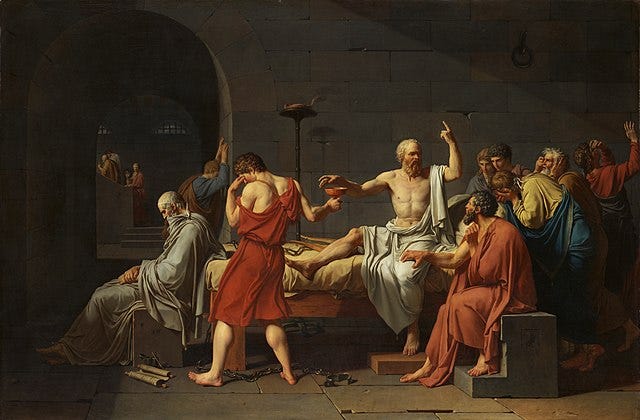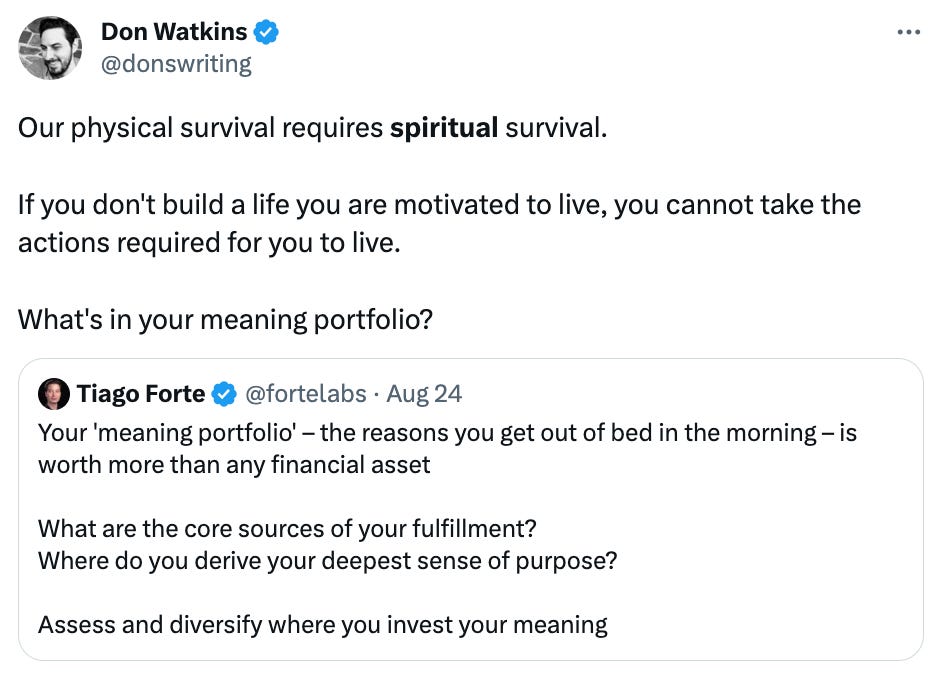A Morality of Reason
If you choose to live, you need a moral code to teach you how to flourish.
Last week we saw that values arise from the fundamental alternative living organisms face between existence or non-existence. Living beings need values in order to maintain their ultimate value: their life.
But that left some crucial questions to answer. Even if it’s true that other living organisms pursue their life as their ultimate value, does that mean human beings have to? Isn’t there more to human life than simply staying alive? And plenty of people seem to live just fine without morality—doesn’t the existence of octogenarian thieves and murderers pose a big problem for a life-based morality?
Let’s answer those questions.
Not Avoiding Death, but Optimizing for Life
A moral code is a guide for realizing your ultimate value. Plenty of people avoid dying for a long time without a moral code, but if life is your ultimate value, the aim is not to avoid the morgue. It’s to optimize for life.
Optimizing for life means recognizing that you have complex material and psychological needs that require ongoing attention.
You need food, clothing, shelter, medicine to secure your physical survival. And you also need the things that allow you to meet those needs: tools, energy, transportation, and an entire knowledge and production system that allows human beings to create ever-more powerful and abundant tools, energy, and transportation.
You meet your material needs by exercising thought and effort—reason and production. You use your mind to discover the way the world works, and you use that knowledge to reshape the world to achieve your purposes.
But to carry out that life-promoting process, you also have profound psychological needs.
Think of someone who is riddled with self-doubt and depression. He’s less likely to undertake demanding projects. He may even find it difficult to hold down a low-level job and attend to basic needs like brushing his teeth and showering. Without the sense that life is worth living, he’s less able to take the actions necessary to live.
If life is your goal, cultivating a sense of purpose, self-confidence, and self-worth are not luxuries, but vital components of optimal functioning. That’s not something you can get out of the way during the workweek, leaving you free to pursue other goals on the weekend. To optimize for life, all of your energy and effort must be directed toward building, strengthening, and enjoying your life.
The purpose of morality is to teach you how to do that.
Optimizing for Life Requires a Morality of Life
Other organisms act automatically to support their lives. But human beings aren’t born knowing how to live. As a rational being, you have an unlimited potential for understanding the world, but all of your knowledge is hard-won: you have no instincts, no automatic, unerring knowledge to guide you.
Much of the knowledge your survival requires is small-scale and tactical. Don’t touch a hot stove. Look both ways before crossing the street. But the core of optimal living is long-range and strategic: it’s about how to chart a course that spans decades and secures your material and psychological flourishing.
How do you chart such a course? That’s the purpose of a moral code. It describes in abstract terms what a flourishing human life consists of, giving you a blueprint for building your distinctive life.
We’ve already touched on some of the universal values and virtues that add up to a human life. As organisms who survive through thought and production, and who must have the self-confidence and self-worth to engage in thought and production, our three cardinal values are: reason, purpose, and self-esteem. We have to cultivate our minds, actively work to achieve life-supporting values, and build a character that makes us able to live and worthy of happiness.
Achieving these values requires a corresponding set of virtues: rationality, productiveness, and pride. Rationality means the commitment to use reason as our only guide to knowledge, values, and action. Productiveness means building our lives around a fulfilling productive career. Pride means our commitment to cultivating the best possible moral character.
And, because other people are both enormous potential values and enormous potential threats, a pro-life morality requires the virtue of justice: judging people rationally and treating them as they deserve. This means praising and forming mutually fulfilling relationships with good people—and avoiding, ostracizing, and (in criminal cases) punishing bad people.
Existentially, living according to a pro-life moral code is how we secure our existence. Psychologically, the insignia of securing our existence through moral action is: happiness.
Morality’s Authority
Why be moral? Religious thinkers often equate an objective morality with a morality that you in some sense have to follow. It’s a set of duties you must obey—or else it is, in Christian apologist William Lane Craig’s words, “just a human convention” that is “wholly subjective.”
It’s understandable why religious thinkers believe morality must consist of unchosen duties: otherwise, you would have no reason to obey the senseless rules their moral code imposes.
But it is all too clear why you should follow a pro-life morality: your life (and happiness) depends on it. You have everything to gain from such a code—and nothing to lose. Indeed, you have everything to lose from not following such a code.
Nevertheless, following a pro-life morality is not a duty. You need morality only if you choose to live. If you don’t choose to value your life, then you don’t need morality’s guidance. You don’t need any guidance. You’re free to stop acting and let nature take its course.
This is not some “get out of morality free” card that prevents us from judging death-seekers or leaves us at their mercy. A person who does not choose to live has made himself an enemy of those of us who do value our lives. Though he cannot be swayed by moral reasoning, which depends on his desire to live, we can nevertheless refuse to deal with him. And, if he attempts to impose his self-destructive course on us by force, we will act to stop him by force.
Morality has profound authority: you must follow its principles—if you want to live. Choice doesn’t make morality subjective or conventional. Morality’s guidance is not based on whim or convention, but on ineradicable facts about the nature of human life. Moral principles are absolute. You do not get to choose the content of morality—you only get to choose whether to value this world and all it has to offer, or to value nothing at all.
What’s Next?
Our focus so far has been the objectivity of morality’s goal. Values are what support and constitute an organism’s life. Human beings, however, have free will. We don’t automatically value our lives or know how to live. If we choose to live, the purpose of morality is to teach us how.
But while I’ve sketched out some of the content of a pro-life morality, I haven’t said much about how we derive that content. Next week we’ll answer the question: what makes morality’s guidance objective?
3 Fun Things
A Quote
"Being alive, selves work to stay alive, doing work that we are able to do because we are alive. Our means and ends are circular. We engage in means-to-ends behavior most fundamentally toward the end of maintaining our self-regenerative means.”
—Jeremy Sherman, Neither Ghost Nor Machine
A Resource
Life as the Standard of Value: Ayn Rand's Proof with Harry Binswanger. Philosopher Harry Binswanger gives a step-by-step account of Ayn Rand’s argument for an objective morality, and shows how it answers Hume’s “is/ought gap.”
A Tweet
Effective Egoism 101
The conception of earthly idealism I champion was defined by Ayn Rand. Here are three key works that summarize her perspective:
Faith and Force: Destroyers of the Modern World by Ayn Rand
Causality vs. Duty by Ayn Rand
The Objectivist Ethics by Ayn Rand




It has seemed clear and simple to me from the moment I started learning just what morality is, or should be, from Ayn Rand 25 years ago. None of it has changed in the intervening time, because it is all true. In order to live one needs to think. In order to properly navigate the innumerable choices available to us one needs a rational set of principles to follow, i.e. an objective moral code. Why is this so hard? And yet so very few people appear to be able to grasp it. Kudos, Don, for this excellent explanation of what it is and why it is needed.